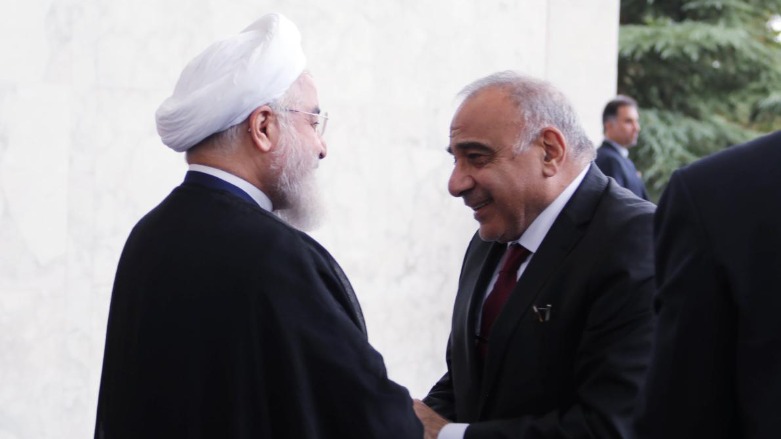Iraqi PM, Iranian President discuss ‘ways to defuse’ Gulf tensions

ERBIL (Kurdistan 24) – In a meeting in Tehran, the top officials of the two neighboring states of Iraq and Iran discussed, among other topics, easing Gulf tensions, which have spiked between Baghdad’s regional ally and the West in recent months.
Iraq’s Prime Minister Adil Abdul Mahdi arrived in the Iranian capital in the afternoon, spearheading a delegation that included his ministers of finance, defense, oil, and transportation, as well as his national security advisor, and other officials and advisors, according to a statement from his office.
“Relations between the two neighboring nations, the developments in the region, and ways to defuse the current crises,” led discussions during the meeting between Iran’s President Hassan Rouhani and Abdul Mahdi, the PM’s office said.
Before his departure, Abdul Mahdi talked on the phone with British Defense Minister Penny Mordaunt on the latest regional developments, including “freedom of navigation,” a readout from Baghdad summarizing the conversation said.
The two sides stressed “the necessity of achieving security and stability in the Gulf region and the Middle East, and the importance of freedom of navigation for all countries and respect for international law and agreed to cooperate to achieve this.”
Related Article: Iran seizes British oil tanker in Strait of Hormuz
Earlier this year, the Iraqi prime minister expressed his country’s willingness to act as a mediator in the building Gulf tensions.
The UK and Iran have entered a standoff after the former captured an Iranian oil tanker off the coast of Gibraltar, saying it was headed for Syria in contravention of EU sanctions. Tehran disputes this and, in an apparent act of retaliation, seized a British-flagged ship in the Strait of Hormuz.
Britain called Iran’s action – an operation carried out by the Islamic Revolutionary Guard Corps’ (IRGC) navy – a “hostile act” and rejected Tehran’s claims their carrier had been detained because it was involved in a collision.
This comes in tandem with an increasingly difficult situation between the US and Iran, marred by many incidents since Washington withdrew last year from a nuclear deal between the Gulf country and world powers and re-imposed successive rounds of punitive sanctions that have crippled its economy.
Last month, Tehran shot down a US surveillance drone in the Gulf of Oman, claiming the plane had breached its airspace and did not respond to multiple warnings. Washington disputes this and insists the aircraft was flying over international waters at the time.
Earlier on Monday, Iran’s Intelligence Ministry said in an announcement they had captured 17 alleged spies over the past year, claiming they were trained by the US Central Intelligence Agency (CIA) and operating in their country. The US said the statements were false.
Editing by Karzan Sulaivany
